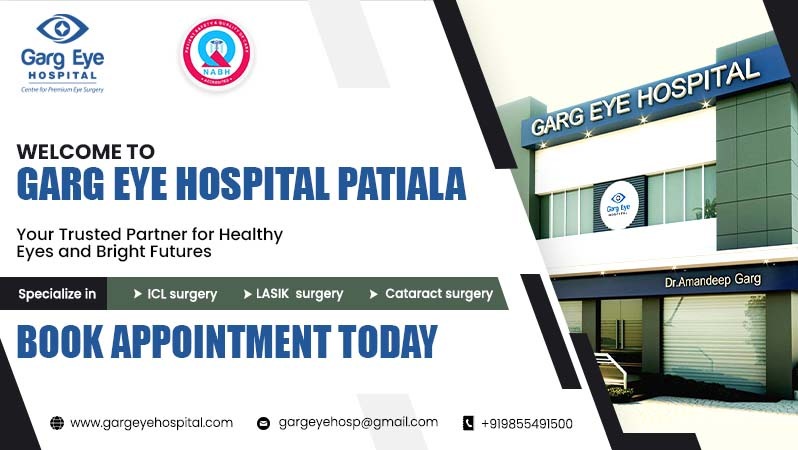Cataract Surgery in Patiala, Punjab – In Punjab, there are higher chances of cataracts (Motiyabind) which is an opaque or cloudy area on the eye lens. An estimated 15% of people aged 30 and older is the prevalence rate which means a higher risk of blindness. To prevent it, you need the best Cataract surgery in Patiala, Punjab. Garg Eye Hospital is the best eye facility offering lens replacement surgery i.e. cataract treatment. With the help of experienced and skilled eye doctors, we will safely remove the affected natural lens (also called the “crystalline lens”). For this, we have been using the best quality artificial intraocular lens (IOL) that lasts longer and is suitable for all age groups.

Table of Content
Cost of Cataract Surgery in Patiala – Garg Eye Hospital
The cataract surgery price in Patiala can go anywhere from INR 10,000 to 1 Lacs. The price also depends upon the age, eye condition, and overall health condition of the patient. We want to ensure that our treatment provides the best, especially for patients with diabetes, old age, etc.
At Garg Eye Hospital, it is our goal to ensure that our clients get world-class eye treatment without burning a hole in their pockets. We have affordable cataract surgery charges in Patiala where the best cataract surgeon will perform the treatment. Whether you have cataracts in one eye or both eyes, our cataract hospital services the needs of people across Patiala, Nabha, Ludhiana, Sangrur, etc.
Best Hospital For Cataract Surgery In Patiala | Punjab – Garg Eye Hospital
Treat Motiyabind or Cataract at Garg Eye Hospital – a trusted name in the eye care facility in Punjab. We have years of experience and have performed successful surgeries throughout the years. Our eye doctors have the right knowledge and skills to offer the best solution for Motiyabind. Our hospital specializes in Cataract treatments for all ages. We are one of the few cataract hospitals in Patiala to offer cataract surgery for children. Our staff understands your needs and works tirelessly to bring back your clear vision. We are certified with NABH and have always followed strict quality-safety standards for our patients.

All Kinds of Lenses Available for Cataract Surgery
At Garg Eye Hospital Patiala, we offer motiyabind operation starting at Rs10000 per eye (price may vary due to patient condition and other factors). We have advanced Lombart instruments for the diagnosis like Lenstar optical biometry.
- Toric Lens For Astigmatism Correction
- Multifocal And Trifocal Lenses For Presbyopia Correction
- Cataract Surgery With Foldable Lens
Contact for Cataract Surgery Surgery Information at +91 9855491500.
Connect now to learn more about our cataract treatment in Patiala!
Advanced Advanced Equipment For Lens Power Calculation For Cataract Surgery


Meet Dr. Amandeep Garg – Leading Cataract Surgeon
Qualified Ophthalmologist, Dr. Amandeep Garg is a trusted Phaco surgeon who has years of experience in dealing with cataract eye issues in various age groups. He has performed some of the most demanding and complicated eye surgeries giving 100% guaranteed results. His knowledge and expertise have garnered positive reviews from people across Punjab and abroad who want to opt for lenses astigmatism correction, presbyopia correction, etc.
Find the Patient’s Reviews

Cataract – What is it? Why Does it Happen?
In Punjab 1 in 4 people aged 50 and older will have cataracts. It is very common but should not e taken lightly. Your eye lens needs light onto the retina at the back of the eye. This allows you to see clearly without any obstruction. A cataract is a condition where the naturally clear lens is fogged or cloudy. This happens when the proteins in the lens start to lump together. This forms a cloud-like appearance on the eye, making the vision blur. This is very common in old age and aging people due to factors playing a part in it. Prolonged and untreated cataracts in the eye can lead to blindness and other vision problems.
The major Causes of Cataract are:
- Genetics
- Eye injuries or Trauma
- Excessive Sun Exposure
- Certain Medications (Like corticosteroids, contribute to cataract development.)
- Medical Conditions (like diabetes, hypertension etc.)
Lens replacement surgery or Cataract surgery is a common medical procedure that involves removing a clouded lens from the eye and replacing it with an artificial, clear lens. During surgery, a surgeon makes a small incision, breaks up the cloudy lens using ultrasound or laser ad removes the fragments.
Why Treating Cataracts is Important for Your Vision?
- Blurr vision with Reduced color perception: The cloudy cataract on your eye can cause incoming light to the lens to scatter and distort. This also means you won’t be able to differentiate between colors because they may appear added – less vibrant for you to recognize.
- Sensitivity to Glare/Low Light: Any bright light, flashing headlight sunlight, or any other light source can be sensitizing your vision overall. You will experience increasing sensitivity, especially at night or in a dimly lit environment.
- Difficult Vision: People with cataracts face issues like double vision and frequent changes in their optometrist’s prescription. You will need to change eyeglasses or contact lenses more often as cataracts cause different vision in one eye or in certain lighting conditions.
Types of Cataracts That Might Be Facing
Anyone can form any of the following cataracts at any stage of life. These are discussed as follows:
1. Nuclear Cataract: Commonly seen in people over the age of 50, This cataract forms at the center (nucleus) of the lens. This causes nearsightedness and yellowing or browning of the lens, affecting color perception.
2.Cortical Cataract: The cataracts form in the lens cortex (the outer part of the lens that surrounds the nuclei). As they progress, this causes glare, difficulties with contrast, and changes in vision.
3. Subcapsular Cataract: Cataracts form directly beneath the lens capsule and at the back of the lens causing Posterior Subcapsular Cataracts (affecting younger individuals) or Anterior Subcapsular Cataracts (caused by medications).
4. Congenital Cataract: Causes due to genetics, infections, or developmental issues during pregnancy causing cataracts at birth or developing during infancy.
5. Traumatic Cataract: This is a result of eye injuries or trauma that can be seen immediately or develop in a few years.
6. Secondary Cataract (Posterior Capsule Opacification): Also called, “after-cataract”, this condition happens after some time when the posterior lens capsule that holds the artificial intraocular lens (IOL) in place becomes cloudy.
7. Radiation Cataract: Caused by prolonged exposure to certain types of radiation, such as radiation therapy for cancer.
8. Diabetic Cataract: Diaetic patients are higher at risk of developing it. These cataracts are often classified by their specific characteristics, such as cortical or subcapsular.
9. Age-Related Cataract: One naturally develops cataracts as part of the aging process.
Different Cataract Surgery & Treatments Options
Looking at the different types of cataracts and reliability criteria, one can suggest a treatment that is perfect for their overall health and eye condition. These procedures are developed in a way to meet patients’ specific needs by their condition.
- Manual Small Incision Cataract Surgery (MSICS): Similar to ECCE, it is performed manually using a smaller incision.
- Femtosecond Laser-Assisted Cataract Surgery: It is used to create precise incisions and assist in breaking up the cataract.
- Laser-Assisted Cataract Surgery with Image Guidance: A perfect combination of femtosecond laser technology with real-time image guidance. This allows improved incisions and lens positioning.
- Intracapsular Cataract Extraction: This involves removing both the lens and the lens capsule.
Your cataract eye doctor in Pataila will suggest the best treatment for you after carefully understanding your medical history and condition.
Know More About LASIK Treatment:










